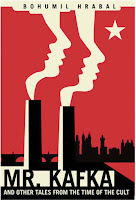Mr. Kafka and Other Tales from the Time of the Cult
by Bohumil Hrabal
translated by Paul Wilson
Recommended Ages: 15+
A friend loaned me this book of stories translated from Czech. I guess he sensed our shared interest in music of Stalinist-era Russian composers would likewise translate into an interest in stories written by an author (1914-97) who lived through what he called "the time of the cult of personality" - the cult, that is, of Stalin. First published between the late 1940s and the mid-1950s, when the rave for Soviet-style communism in Czechoslovakia rose to its crest and went into descent, it reached its final form in a 1965 reprint titled Want-ad for a House I No Longer Wish to Live in, which restored the bits previously censored out. In Canadian translator Paul Wilson's rendering, it reads like an interconnected series of prose poems, with astonishing flashes of lyricism alternating with long inventories of mundane items, passages of disturbing and depressing narrative, crackling fusillades of irony, and what seems to be word-for-word records of conversations the author may have observed as he did forced volunteer labor at a scrap-metal recycling mill.
Parts of the book seem, in fact, to be a kind of love-letter to a female personification of the Poldi mill which, Wilson's afterword explains, had a woman's silhouette in its corporate logo. In interlarded vignettes it introduces us to such quirky characters as a judge, a dairyman, a priest, a cop, a sergeant major, and others who have been uprooted from their pre-revolution lives and sent to labor in the mines or the mills. There is a communist true-believer who has trouble accepting the disjoin between his ideals and their application in reality. There is a guard overseeing a group of female convicts who fancies himself their guardian angel. There is a sociopathic fireman so captivated by his own spiffiness that he commits casual rape and gloats over the gruesome death of a child.
Meanwhile, in stories set outside the Poldi yard, we meet a fevered artist who all but kills himself to produce a piece of patriotic art that proves unwanted; a stonemason who actually considers killing himself while watching attempts to demolish a statue of Stalin, to whose cult he is still devoted; an auxiliary policeman who considers it his duty to arrest people who jump off moving streetcars; a terrifying, dictatorial theater ticket-taker who experiences a religious conversion while watching a musical duel between a dance-hall band and a symphony orchestra; and, in two framing stories, including the one that lent its title to the collection, a surrealistic, stream-of-consciousness narrative of a fellow whose minute observation of everything going on around him, from the streets of Prague to the Poldi millyard, teeters on a thin wire between romantic rhapsody and insane babbling.
This book shows Hrabal to be the kind of writer who can make a stenographic record of all that he sees and hears glow with a weird beauty - even while allowing the reader to feel the grip of horror at what he, and everyone near him at that time, had to go through. I think it would be an instructive book for many Americans today, when another movement is afoot to tinker with society in ways that could produce similarly weird and horrible results. If only we also had creative minds among us who were prepared to transmute the experiences to come into beauty. We might begin to get them by sharing and enjoying this fascinating book.
Friday, April 29, 2016
Subscribe to:
Post Comments (Atom)








No comments:
Post a Comment